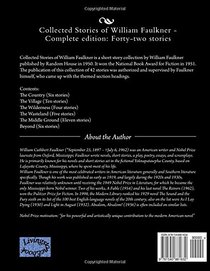Search -
Collected Stories of William Faulkner - Complete edition: Forty-two stories: Enriched by Author's Banquet Speech for his Nobel Prize (Nobel Price in Literature)
Collected Stories of William Faulkner - Complete edition Forty-two stories Enriched by Author's Banquet Speech for his Nobel Prize - Nobel Price in Literature
Author:
William Cuthbert Faulkner (*September 25, 1897 ? ?July 6, 1962) was an American writer and Nobel Prize laureate from Oxford, Mississippi. Faulkner wrote novels, short stories, a play, poetry, essays, and screenplays. He is primarily known for his novels and short stories set in the fictional Yoknapatawpha County, based on Lafayette County, Missi... more »
Author:
William Cuthbert Faulkner (*September 25, 1897 ? ?July 6, 1962) was an American writer and Nobel Prize laureate from Oxford, Mississippi. Faulkner wrote novels, short stories, a play, poetry, essays, and screenplays. He is primarily known for his novels and short stories set in the fictional Yoknapatawpha County, based on Lafayette County, Missi... more »
ISBN-13: 9781540881632
ISBN-10: 1540881636
Publication Date: 12/16/2016
Pages: 610
Rating: ?
ISBN-10: 1540881636
Publication Date: 12/16/2016
Pages: 610
Rating: ?
0 stars, based on 0 rating
Publisher: CreateSpace Independent Publishing Platform
Book Type: Paperback
Members Wishing: 0
Reviews: Amazon | Write a Review
Book Type: Paperback
Members Wishing: 0
Reviews: Amazon | Write a Review
Genres:




